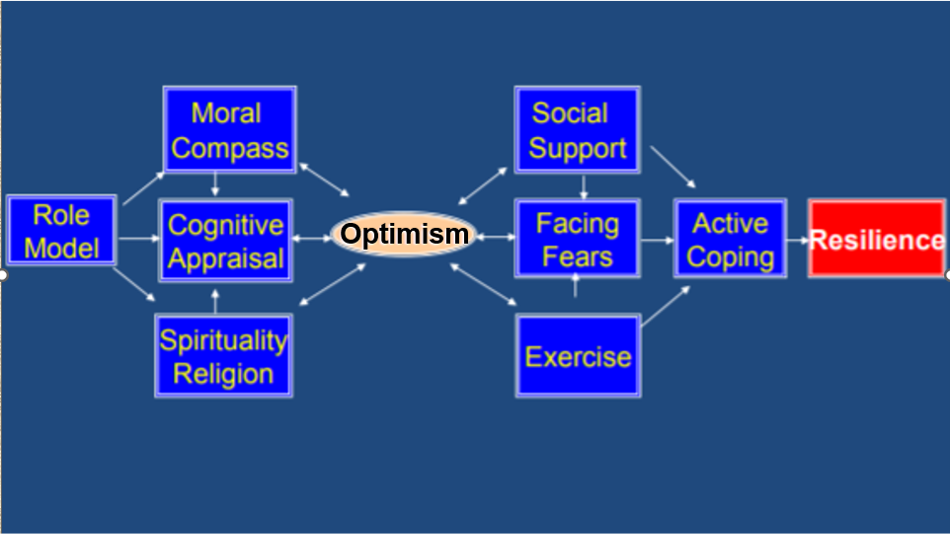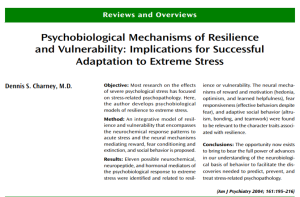 BUILDING RESILIENCE
BUILDING RESILIENCE
by Richard Weil, M.Ed, CDE
Transformation Weight Control
www.transformationweightcontrol.com
- Positive Attitude
- Optimism is strongly related to resilience
- Maintain a realistic appraisal of the negative
- Pay more mindful attention to your thoughts and work to insert positive expectations in your thinking (“I can handle this situation”) while filtering out or refuting, exaggerated or irrelevant negative thoughts (“I am not capable of handling stress so I will always be a failure”).
- Neurobiological Mechanisms: Reward circuits, converse of learned helplessness.
- Cognitive Flexibility through Cognitive Reappraisal
- Traumatic experiences can be re-evaluated by altering the perceived value and meaningfulness of the event
- One can receive a benefit from stress and trauma: one can reframe, assimilate, accept and recover. These skills can be learned.
- Failure is an essential ingredient for growth
- Neurobiological Mechanisms: Memory Reconsolidation, Cognitive Control of Emotion, Memory Suppression
3. Embrace a Personal Moral Compass
- Develop a set of core beliefs that very few things can shatter
- For many, faith in conjunction with strong religious and/or spiritual beliefs is associated with resilience
- Altruism has been strongly related to resilience. Survivor Mission.
- Neurobiological Mechanisms: Neural model of human morality, altruism & human evolution
4. Clarify Your Values: The 7 Criteria of Values Clarification
- Chosen freely
- Chosen from alternatives
- Chosen after due reflection
- Prized and cherished
- Publicly affirmed
- Acted upon
- Part of a pattern of repeated action
5. Find a Resilient Role Model
- Role models can be found in one’s own life (Imprinting)
- Imitation is a very powerful mode of learning (Conditioning)
- Neurobiological Mechanisms: Neuronal Imprinting of Human Values (Learning)
Reality Tunnels
“Every kind of ignorance in the world results from not realizing that our perceptions are gambles. We believe what we see and then we believe our interpretation of it, we don’t even know we are making an interpretation most of the time. We think this is reality.” by Timothy Leary and Robert Anton Wilson
A parallel can be seen in the psychological concept of CONFIRMATION BIAS—the human tendency to notice and assign significance to observations that confirm existing beliefs… while filtering out or rationalizing away observations that do not fit with prior beliefs and expectations.
Back to BUILDING RESILIENCE
6. Face Your Fears
- Fear is normal and can be used as a guide
- Facing your fears can increase your self-esteem
- Learn and practice skills necessary to move through the fear
- Neurobiological Mechanisms: Extinction, Stress Inoculation
7. Develop Active Coping Skills
- Resilient individuals use active rather than passive coping skills
- Neurobiological Mechanisms: Functional Neuroanatomy of Fear Mechanisms
- Minimize appraisal of threat, create positive statements about oneself, seek support of others, & ACT (Acceptance and Commitment Therapy)

8. Establish and Nurture a Supportive Social Network
- “support accessible to an individual through social ties to other individuals, groups, and the larger community” (Lin et al J Health Soc Behav 1979)
- Very few can “go it alone”
- Considerable emotional strength accrues from close relationships with people and organizations
- A safety net during times of stress
- Neurobiological Mechanisms: Cognitive Neuroscience of Human Social Behavior
- Social support is exceptionally important to maintaining good physical and psychological health in the presence of genetic, developmental, and other environmental risks.
- Social support appears to be an exceptionally important stress resilience factor
9. Attend to Physical Well-being
- Prioritize exercise. It has positive effects on physical hardiness, mood, and improves self-esteem
- Neurobiological Mechanisms: Effects on neurogenesis, cognition, regulation of emotion, immune function, etc.
10. Train Regularly and Rigorously in Multiple Areas
- Change requires systematic and disciplined activity
- Concentrate on training in multiple areas: emotional intelligence, moral integrity, physical endurance
- Recognize, Utilize & Foster Signature Strengths
- Learn to recognize your character strengths and engage them to deal with difficult & stressful situations.
- Accept that change is a part of living
- Certain goals may no longer be attainable as a result of adverse situations.
- Accepting circumstances that cannot be changed can help you focus on circumstances that you can alter. “Objective hazards.”
- Move toward your goals
- Develop realistic goals
- Do something regularly — even if it seems like a small accomplishment
- Ask yourself, “What’s one thing I know I can accomplish today that helps me move in the direction I want to go?”
- Take decisive actions
- Act on adverse situations as much as you can.
- Take decisive actions, rather than detaching completely from problems and stresses and wishing they would just go away.
- Look for opportunities for self-discovery
- People often learn something about themselves and may find that they have grown in some respect as a result of their struggle with loss.
- Many people who have experienced tragedies and hardship have reported better relationships, greater sense of strength even while feeling vulnerable, increased sense of self-worth, a more developed spirituality and heightened appreciation for life.
- Keep things in perspective
- Even when facing very painful events, consider the stressful situation in a broader context and keep a long-term perspective.
- Avoid blowing the event out of proportion.
- Learn From Your Past
- Focusing on past experiences and sources of personal strength can help you learn about what strategies for building resilience might work for you.
- By exploring answers to the following questions about yourself and your reactions to challenging life events, you may discover how you can respond effectively to difficult situations in your life
a) What kinds of events have been most stressful for me?
b) How have those events typically affected me?
c) Have I found it helpful to think of important people in my life when I am distressed?
d) To whom have I reached out for support in working through a traumatic or stressful experience?
e) What have I learned about myself and my interactions with others during difficult times?
f) Has it been helpful for me to assist someone else going through a similar experience?
g) Have I been able to overcome obstacles, and if so, how?
h) What has helped make me feel more hopeful about the future?
- Stay Flexible
- Resilience involves maintaining flexibility and balance in your life as you deal with stressful circumstances and traumatic events.
This happens in many ways:
- let yourself experience strong emotions
- realize when you may need to avoid experiencing them at times in order to continue functioning
- step forward and take action to deal with your problems and meet the demands of daily living
- step back to rest and reenergize yourself
- spending time with loved ones to gain support and encouragement, and also nurture yourself
- relying on others as well as yourself

The finest paper I ever read on the science and neurobiology of resilience was written by Dennis Charney, MD, Dean of the Icahn School of Medicine at Mount Sinai Hospital in New York City. Dr. Charney has done a lot of resilience research. This paper is very medical and scientific, but I don’t think you need to understand all the technicalities. The take-away is simple: resilience isn’t just a personality trait that you learn (although you can learn how to be more resilient), but rather Dr. Charney explains how the brains of resilient individuals function differently than individuals who are less resilient. The moral of the story is to not beat yourself up if you’re not as resilient as you’d like to be. It’s not your fault. Rather it’s the neurobiology of your brain at work. But with hard work, you can become more resilient.
Click on the screenshot and you’ll be directed to Dr. Charney’s paper.
Modified from Charney and Southwick Science 2012
© 2024 Richard Weil All Rights Reserved
